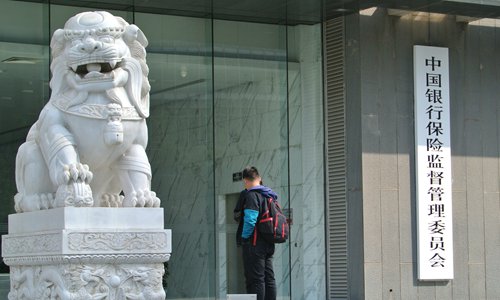SOURCE / INDUSTRIES
China's fight against financial corruption targets small, medium banks
Fight against financial corruption targets small, medium banks

Two people chat outside the headquarters of the China Banking and Insurance Regulatory Commission on April 8. Photo: IC
China's crackdown on financial corruption, which is now eyeing a wider range to cover small and medium-sized banks, will motivate even deepen financial reform as the country is at a critical period of economic transition, experts noted.According to a recent announcement on the website of the Changsha commission for discipline inspection, Meng Gang, a deputy head of the Bank of Changsha in Central China's Hunan Province, was dismissed from his membership of the Communist Party of China and expelled from the bank due to taking large bribes and providing loans illegally.
Since taking power in August 2015, Meng has violated rules to hold shares of unlisted companies and used his position for the benefit of himself and other people, the announcement said.
At least 20 executives at small and medium-sized banks have been investigated since January 2019, financial news outlet Yicai reported.
For example, the former chairman of the board at Shandong-based Hengfeng Bank received a suspended death sentence because he transferred shares in the bank valued at 754 million yuan ($108.16 million) to companies that he or people close to him controlled, china.com reported.
"Most of the small and medium-sized banks in China adopt a 'parental control' mechanism, which means the head of the bank has the final say," Dong Dengxin, director of the Finance and Securities Institute at Wuhan University of Science and Technology, told the Global Times on Monday, noting that situation means it's more likely to result in moral hazards such as corruption.
Dong advised small and medium-sized banks to use mature supervision institutional norms of large banks as a reference, especially strengthening reviews of business related to loans and power control.
"In the past, China's financial regulation mainly relied on administrative supervision by the China Securities Regulatory Commission and China Banking and Insurance Regulatory Commission, but now organs of the public security, public prosecutors and the courts all get involved in combating financial crimes," Dong said.
Dong noted that the crackdown on financial corruption should not only target state-owned financial firms or banks, but should also cover the whole industry.
He added that new technologies such as big data and cloud computing could help with tracking and monitoring economic operations and China uses them well.
Last year, China's former top securities regulator Liu Shiyu surrendered to the anti-graft agency. He had been found to have used his position for personal gains and accepted gifts.
"The fight against financial corruption will drive the country's whole anti-graft progress. It will also motivate, and even deepen, China's financial reform," Zhuang Deshui, a deputy director of the Research Center for Government Integrity-Building at Peking University, told the Global Times.
He noted that corruption impedes China's financial reform and it's time for the country to resolve the problem with tough stance under the current economic situation.

